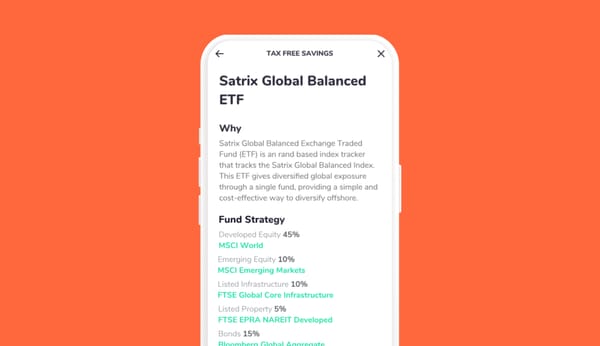The US stock market is down.
At the end of last week the big markets in the USA were lower than they were at the beginning of January. Yesterday (Monday) morning stock futures were suggesting the markets would remain flat or negative. While they ended up rallying quite strongly there is still a chance share prices will fall again.
And the question is… should you care?
Interestingly, the size of the drop won't change our answer to this question (if you don't like percentages you can skip the next bit and jump to the heading below) but for the record – between 3 and 26 January 2022 the S&P500 (an index representing 500 of the biggest businesses in America) fell about 10%. The Nasdaq (an index which includes many big tech stocks like Apple and Google) was down nearly 15%.
Does this matter given that we're in South Africa?
It could. You might have heard that US stock markets tend to influence the whole world; if they keep going down, shares in SA might follow.
So far shares in South Africa have held up quite well. The Johannesburg Stock Exchange (JSE) recovered a bit last week, and both US markets and the JSE rallied yesterday. At the time of writing (Tuesday 1 Feb) the JSE is less than 2% off its all-time high but the S&P500 is still around 6% below its 3 January peak.
But What Does It All Mean?
What has happened over the last month gives market commentators something to talk about on the radio but it's not unusual. The stock market goes up, on average, in the long term, but share prices go up and down in the short term.
As investors, what matters to us is the long-term performance of the market. For example, from late March 2020 (the COVID dip) to the end of 2021 the S&P500 more than doubled (it was up around 114%). The JSE and the Satrix 40 were up around 90% in rand terms.
This is the kind of growth that makes investors stick with the share market.
But what if the next big crash is just around the corner? After all, you might hear on the radio that interest rates are on the up all over the world – increasing interest rates often put a damper on share prices. Does that mean it's time to switch into cash?
The answer to this depends on your investing goals. But for those in the Franc community who are investing in Satrix 40 the best idea is to stick to the plan.
Bear in mind that we are investors, not traders.
The Franc community is made up predominantly of people in the "building" or "accumulation" phase of their wealth-building journey. (It must be said that if you're on the point of retirement, the guidance given here may not apply.)
Also bear in mind that in our view, for any shorter-term goals (less than three years) you should be in cash anyway (ie, earning interest in a risk-free investment).
For periods longer than three years the question is not "Where will the stock market be next week?" but "Where will the market be in four or five years?"
Long-Term Returns
Obviously nobody can guarantee that the share market will be higher in five years than it is today, but there is a very high probability that the rate of return from shares over the next five years will continue to beat other investment options.
This is particularly true if you are investing weekly or monthly and taking advantage of rand-cost averaging.
Rand-cost averaging is where you keep investing regardless of the market movements.
The beauty of rand-cost averaging is that your average entry cost keeps going down if the market is falling. When the market rises again, your gains are better than someone who invested a lump sum before the dip.
Yes, share prices are unpredictable and go up and down a lot. This is exactly what makes the share market scary for many people.
But this "volatility" is also the reason that the stock market offers a higher rate of return – at least double that offered by other asset classes over the long term.
To get this better return you have to stick to the plan (keep investing) and resist the urge to take profits when there is a market dip.
Next Week… Next Month… Next Year…
As mentioned earlier, the JSE has held up quite well. The Satrix 40, the ETF available to Franc investors, is only marginally down.
Where will the market be next week… or next month… or next year? Nobody knows.
Let's emphasize that – nobody can tell you where the stock market will be in the future. Ask a hundred experts and half will tell you one thing... and the other half will tell you the opposite.
If you are a trader you are having a tough time right now trying to decide if the current correction is a buying opportunity or the beginning of a bigger fall in share prices.
But what we do know as investors is that the share market has provided very good rates of return for at least a hundred years to those investors who stay in the market for the long haul.
So should you care that US markets were down over January?
If you're young and in the wealth-building phase – like most Franc members – it doesn’t matter. Keep investing every month. If the market correction continues, be happy that your average entry cost will be reducing.







![How & Why You Should Do a Financial Reset [+ downloadable financial reset journal]](/blog/content/images/size/w600/2024/12/Setting-goals-for-the-year.png)


